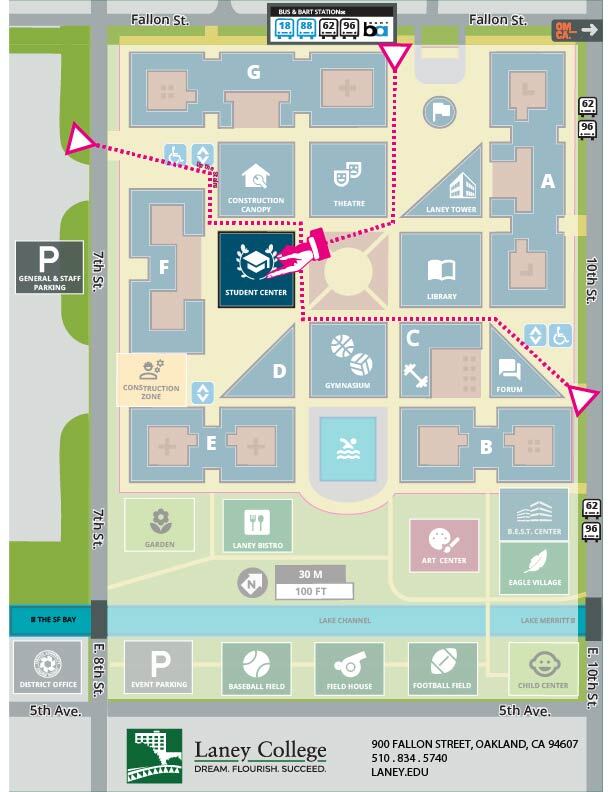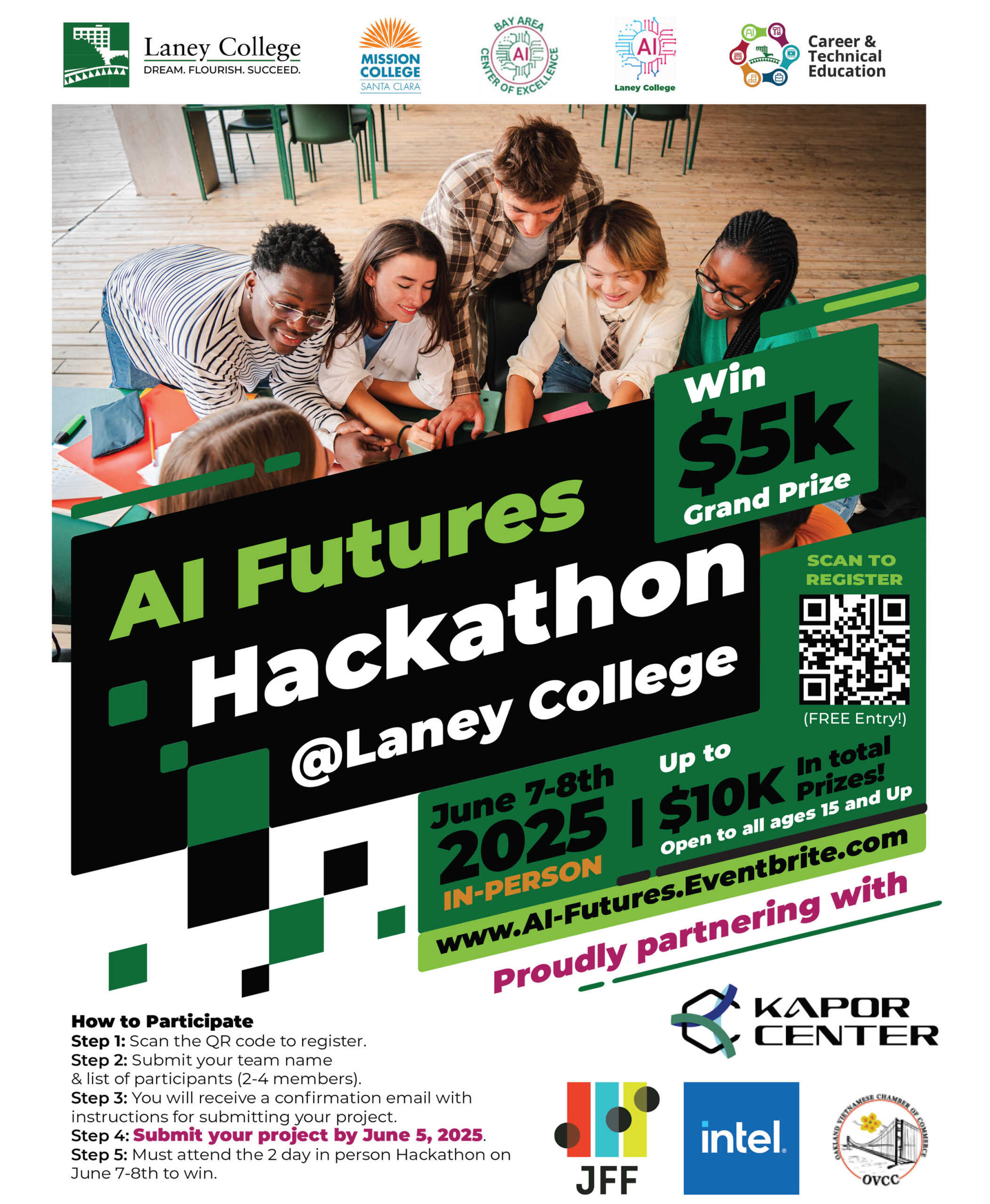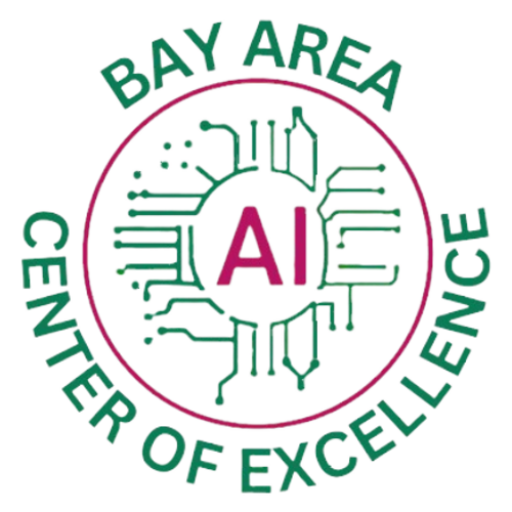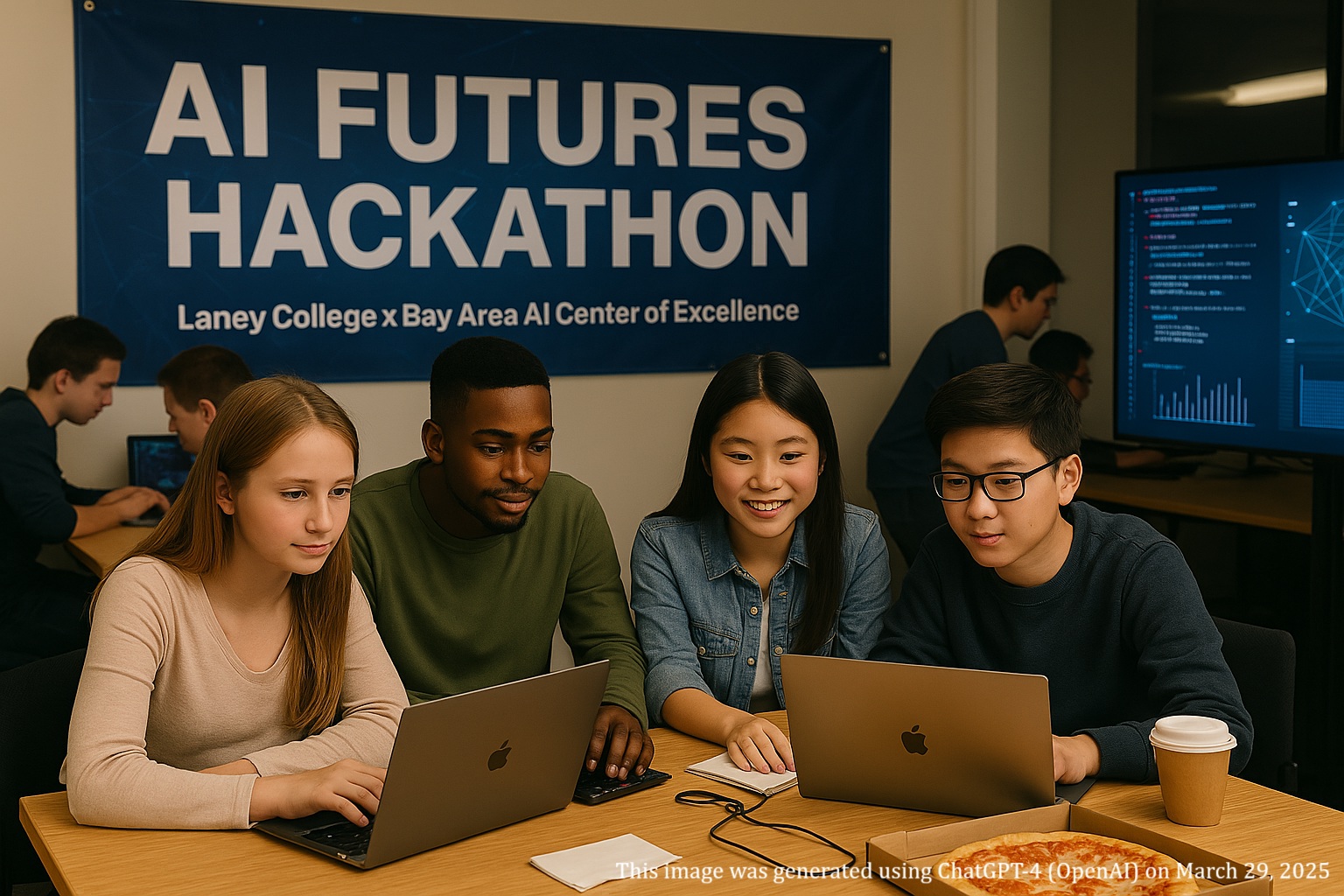Introduction
The “AI Futures” Hackathon, organized by the Laney College AI Department and collaborating with Mission College with support at the Bay Area AI Center of Excellence (BAAICOE), is a dynamic event designed to cultivate emerging AI talent and drive innovation in our community.
This 48-hour in-person hackathon will empower participants to develop AI-based solutions for pressing real-world challenges. We invite you to participate with us in this impactful event and help shape the future of AI.
Hackathon Details
The “AI Futures” Hackathon will be held at Laney College on June 7th and 8th. Participants will collaborate in teams to develop solutions within the following challenge areas:
- Empowering Local Communities: Developing business solutions that directly benefit underserved populations and address specific community needs.
- Transforming Education: Exploring AI’s potential to revolutionize learning, personalize education, and improve accessibility for all students.
- Advancing Healthcare: Creating innovative AI applications to improve patient outcomes, enhance diagnostic capabilities, and optimize healthcare delivery.
- Pioneering Autonomous Systems: Designing and developing cutting-edge AI solutions for the next generation of automation, including but not limited to, applications in robotics, transportation, and environmental monitoring.
The primary goals of the “AI Futures” Hackathon are to:
- Drive Innovation for Community Impact: Provide a collaborative platform for participants to develop AI-driven solutions that address real-world challenges faced by local communities.
- Foster AI Talent Development: Empower participants to enhance their AI skills through hands on experience, expert mentorship, and networking opportunities, preparing them for future careers in this rapidly evolving field. Participants will have access to workshops and mentorship from industry professionals throughout the event.
- Build a Stronger AI Community: Connect students, educators, industry professionals, and community members to foster collaboration and knowledge sharing in the field of Artificial Intelligence.
Judging Criteria
Projects will be evaluated based on the following criteria:
- Impact and Application:
- Description: How significantly does the solution address a relevant problem and improve quality of life? A great project starts with a great impact.
- Examples: Solutions that address food insecurity, provide access to essential services, or improve accessibility for people with disabilities.
- Evaluation: Does the project have a feasible application in the real world? Is it something that someone could use or that would have a tangible benefit?
- Creativity and Innovation:
- Description: How unique and novel is the idea?
- Examples: Solutions that leverage AI in new ways, propose original approaches to existing problems, or demonstrate out-of-the-box thinking.
- Evaluation: Has this been done before, or is it a new idea? Does the project use creativity to brainstorm a new solution, or is it simply replicating an existing one?
- Technical Sophistication and Innovation:
- Description: The advanced nature of the technologies and frameworks used in the project.
- Examples: Use of cutting-edge machine learning algorithms, novel applications of AI, or integration of advanced software engineering practices.
- Evaluation: Does the project utilize any cutting-edge technologies or methodologies? How well does the code adhere to best practices in software development? Does the team display a strong understanding of the technology used?
- Professionalism and User Experience:
- Description: The overall design, usability, and presentation of the project.
- Examples: A well-designed user interface, intuitive navigation, and a polished presentation.
- Evaluation: Does the project include industry-grade UI and UX elements? Is it easy to navigate for a first-time user?
- Functionality and Quality:
- Description: The extent to which the project works as intended and is free of errors.
- Examples: A fully functional application, a robust codebase, and a seamless user experience.
- Evaluation: Is the project free of major bugs? Does it look appealing?
- Presentation:
- Description: The clarity, organization, and persuasiveness of the team’s presentation of their project.
- Examples: A well-structured pitch, clear communication of the problem and solution, and effective use of visual aids.
- Evaluation: How effectively did the team communicate the value and functionality of their project to the judges?
- Ethical Considerations:
- Description: The extent to which the project considers and addresses potential ethical implications.
- Examples: Consideration of data privacy, bias in algorithms, and responsible use of AI.
- Evaluation: Does the project demonstrate an awareness of the ethical considerations related to AI development and deployment?
- Group participation will be in teams of 2 to 4 members, comprising a mix of high school, community college, and university students, as well as other participants. Each group can select a project relevant to the focused areas mentioned above.
Submission Requirements
The submission process will occur in two phases:
Phase 1: Initial Submission (Deadline: June 5th, 11:59 PM)
- Create a GitHub Repository (Initial Step): Each participating group (2-4 members) must create a GitHub repository to host their project. The repository should be private, and you must add the organizer GitHub account as a collaborator.
- How to Add the Organizer as a Collaborator (for private repositories):
- Go to your GitHub repository page.
- Click on the “Settings” tab of your repository (not the organization or account settings).
- In the left sidebar, click “Collaborators” (under Access).
- Under Manage access, click “Add people”.
- Enter the GitHub username of the organizer (e.g., anhtranlaney or anhtran.laney@gmail.com).
- Make sure that you choose the correct name (e.g., anhtranlaney) from the dropdown list.
- Click Add anhtranlaney.
- How to Add the Organizer as a Collaborator (for private repositories):
- Email Confirmation of Participation: Send an email to the organizer at anhtran.laney@gmail.com to confirm your team’s intention to participate by June 5th, 11:59 PM, with the following information:
- Subject: Hackathon Participation Confirmation – [Your Team Name]
- Body:
- Team Name:
- Team Members (Names and Emails):
- Link to your GitHub Repository:
- Confirmation that the organizer account (e.g., anhtranlaney) has been added as a collaborator
- Again, this must be done on or before June 5th, 11:59 PM
In-Person Participation Confirmation: On Saturday, June 7th, between 9:00 AM and 5:00 PM, all participants must come to the Student Center at Laney College in person to:
- Confirm their participation.
- Receive their wristband and instructions on how to add the judges’ accounts as collaborators to their GitHub repository.
- Gain access to the hackathon facilities.
- Collect meal tickets.
- After that, participants are welcome to stay for networking with other participants, mentors, and sponsors.
Below is a map of the Laney College campus. Free Parking is accessible through 7th St on Saturday.

Phase 2: Final Code Submission (Deadline: June 8th, 9:59 AM)
- Final Code Push: All final code and project files must be pushed to the private GitHub repository that each team submitted and shared with the judges during Phase 1. This must be completed on or before 9:59 AM on Sunday, June 8th. Any code modifications after this time may result in disqualification for prizes.
- README File and Project Image: Your repository must include:
- An image of your project.
- A
READMEfile (e.g.,README.md) containing the following information:- Your team’s presentation table number.
- To simplify the process, you no longer need to include your team ID in your submission. The ID will be used internally only.
Important Note: All submitted projects must be original ideas developed specifically for this “AI Futures” Hackathon. Projects that have been submitted to other events or platforms will be disqualified from prize consideration.
Presentation and Awards
- Presentations: Sunday, June 8th, 10:30 AM – 1:30 PM
- Award Ceremony: Sunday, June 8th, 3:00 PM – 5:00 PM
Prizes:
- Grand Prize: $5,000
- 2nd Place: $3,000
- 3rd Place: $1,000
- 4th Place: $500
- 5th Place: Gift Cards
View the event and register on Eventbrite

AI Futures Hackathon: Code of Conduct
Welcome to the “AI Futures” hackathon! We’re thrilled to have you join us for what promises to be an
exciting and innovative event. To ensure a positive experience for everyone, we’ve established the
following Code of Conduct.
Our Commitment to a Welcoming Environment
At the “AI Futures” Hackathon, the organizing team, in collaboration with the Bay Area AI Center of
Excellence (BAAICOE — baaicoe.org), is dedicated to fostering a welcoming, inclusive, and harassment-
free environment for all. This commitment extends to every individual involved: organizers, sponsors,
mentors, volunteers, judges, and hackers, throughout the entire hackathon.
We believe that a diverse and respectful space is essential for fostering innovation. As such, this
welcoming space is for all attendees, regardless of gender, race, ethnicity, nationality, level of experience
and innovation, socioeconomic status or background, or any other attribute. We have a zero-tolerance
policy for harassment of any kind.
Prohibited Harassment Includes, But Is Not Limited To:
- Offensive verbal comments related to gender, age, sexual orientation, disability, physical
- appearance, race, ethnicity, nationality, or religion.
- Display of sexual images in public spaces.
- Deliberate intimidation, stalking, or following.
- Non-consensual photography or audio/video recording.
- Sustained disruption of talks or other events.
- Inappropriate physical contact or unwelcome sexual attention.
Reporting Protocol
If you experience or witness any form of harassment during the hackathon, please report it immediately.
Your safety and comfort are our top priority.
To report an incident, please:
- Locate any organizer or volunteer (they will be wearing designated badges).
- Visit the registration desk and inform the staff.
- Contact the PCCD Department of Community Safety by calling (510) 466-7236.
If an organizer or another hacker notices that you are engaging in any form of harassment and tells you to
stop, you are expected to comply immediately. Failure to comply with this Code of Conduct may result in
immediate expulsion from the hackathon without a refund.
Agenda (subject to change)
Day 1: Saturday, June 7th
- 8:45 AM: Doors Open for Check-in & Breakfast
- Check-In
- Wristband & signing the Media release form
- Meal Ticket (Lunch and Dinner)
- Group Numbering
- Check-In
- 9:00 AM: Resource Tabling
- 9:45 AM: Student Center Main Floor Kick-Off
- MC: Dr. Jennifer Tran, President of the Oakland Vietnamese Chamber of Commerce
- Welcome from:
- Elizabeth (Beth) Maher, Dean at Laney College
- Dr. Clement Lam, Dean at Mission College
- Brian Gonzalez, Executive in Residence, Jobs for the Future (JFF)
- Kirsten Lundgren, Director of Economic and Workforce Initiatives, Kapor Center
- Rowena Brown, Oakland At-Large Councilmember
- Charlene Wang, Oakland Councilmember
- 10:45 AM: Official Hacking Begins
- 10:45 AM: Teams settle into hack areas/rooms — Student Center Main Floor, F251, or F255
- 12:30 PM Working Lunch
- 1:00 PM Resource Tabling ends
- 1:00 PM: Industry Mentors
- Mentor 1: Kirsten Lundgren, Director of Economic and Workforce Initiatives, Kapor Center
- Mentor 2: Drishti Idnani, Data Scientist
- Mentor 3: Risabh Changwani, Robotics Software Engineer
- 5:00 PM: Student Center closes
- 5:00 PM Dinner in F-Quad area
- 5:00 PM Hack in the F-classrooms or areas
- 7:00 PM Facilities close
- Reminder: All project updates & submissions to Github must be completed by 10:00 AM PT on Sunday, June 8th.
Day 2: Sunday, June 8th
- 8:45 AM: Student Center Opens for Breakfast & Hacking
- 10:00 AM: Last submission of project code/work — Github
- 10:00 AM to 10:30 AM:
- MC: Dr. Jennifer Tran, President of OVCC
- Michael Harrison, Intel Program Director
- Dr. Clement Lam, Dean at Mission College
- Tuan Nguyen, AI Faculty at Laney
- 10:30 AM to 10:45 AM: Preparation for Group Presentations — All members must attend.
- 10:45 AM: Group Presentations and Judging begin
- Judge 1: Dr. TomikOskotsky, AI Researcher at UCSF
- Judge 2: Brian Gonzalez, Executive in Residence at JFF
- Judge 3: Michael Harrison, Program Director at Intel
- Judge 4: Steven Imes IV, Startup Advisor, Milque Strategy Group
- 12:30 PM: Break for Lunch
- 1:30 PM: Group Presentations and Judging continue
- 3:15 PM: Group Presentations conclude
- 3:15 PM: Judge Deliberation
- 3:30 PM: Group Photo at the Quad
- 4:00 PM: Winners announced
- 4:30 PM: Prizes awarded
- 5:00 PM: Event concludes
- Hackathon Survey
Thank you all for your incredible participation in the AI Futures Hackathon 2025! We are currently reviewing and finalizing prize results, and as announced during the event, all winners will be contacted individually within 30 to 45 days to arrange prize distribution. We appreciate your patience and look forward to celebrating your achievements soon. If you have any questions in the meantime, please feel free to reach out. Thank you again for making this event a success!



13 Responses
We hope this message finds you well. We are a team of passionate developers from India, and we are very interested in participating in your upcoming hackathon. We would like to know if international teams are allowed to join and if there are any specific requirements or procedures we need to follow.
Hello,
Thank you for your interest in the hackathon! You’re welcome to participate, but please note that all team members are required to attend in person at Laney College on June 7th and 8th.
Best regards,
Nice
Thank you. We hope to see your there.
Best,
Is this event for high school students, college students or professionals?
Hello,
The event is open to high school and college/university students, professionals, and innovative individuals from all backgrounds.
Best,
Hello, I have a quick question: When do you actually start coding the project? Is it in person during the two-day event, or do you just start working on it, create a Github repo by June 5th, and push all the code to the repo by 10 AM on June 8th?
Great question! You can start writing code at any time. There’s no requirement to wait until the in-person event begins. Just make sure that your entire project is completed and all code is pushed to your GitHub repository by 10 AM on June 8th.
Let us know if you have any other questions. Looking forward to seeing what you build!
Best,
Can I be a team of one?
Hello,
After careful consideration, we’ve decided to make an exception this time and allow solo participants to join the event. So if you haven’t found a teammate yet, you’re welcome to participate as a solo team.
We look forward to seeing you at the event!
Best,
When and where will the pictures and videos from the hackathon be shared? It was an amazing event — huge thanks to everyone who made it happen at Laney College!
You always deliver such thoughtful and meaningful content
This brightened my entire week with its positive 💕 and uplifting message